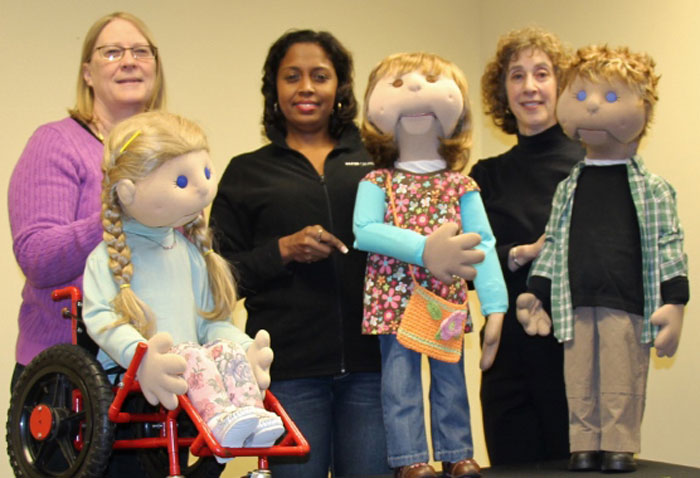
The PACER puppets have been positively impacting children for more than 30 years. Charlotte Green (left) and Lynn Dennis (right) coordinate the program and provide training to volunteer puppeteers, including Natasha Babwah.
PACER puppets from one generation to the next
It was 30 years ago and Vanessa Nordstrom was in the 1st grade when she saw PACER’s COUNT ME IN® puppet show at her Minneapolis elementary school. Apparently it made a lasting impression. In 2013, with her daughter Taylor struggling for acceptance among her classmates, Vanessa remembered the puppets’ message of inclusiveness and called on PACER to help.
Taylor has epilepsy. In many ways she is a typical 7-year-old – she loves to dance and sing and she performs well academically – but social interaction is challenging, especially when her energy level drops and her frustration rises. At times, Vanessa says, her daughter’s actions can frighten other children.
“My husband and I were trying to figure out how we could let the other kids know that Taylor has epilepsy, and how that sometimes impacts her behavior,” Vanessa said. “I remembered the PACER puppets from when I was 6 years old, and a friend urged me to contact PACER about having a puppet show at Taylor’s school.”
Capturing the attention of young children isn’t easy, but PACER’s endearing, life-size, multicultural puppets do it well. Since 1979, more than 350,000 children have seen the COUNT ME IN® (disability awareness) and KIDS AGAINST BULLYING (bullying prevention) puppets. Led by volunteer puppeteers, the innovative, interactive presentations share age-appropriate messages, enabling children to learn through dialogue and question and answer.
Vanessa arranged to have the PACER puppets visit Taylor’s school in the Twin Cities, and she later talked with the children about epilepsy. “Fortunately Taylor has not had any seizures at school, but because of that the other kids haven’t seen her disability – only her behavior,” Vanessa said. “We talked about epilepsy, explained what happens when she has a seizure, and what happens when she is stressed.”
The children were curious and talked a lot about Carmen, the PACER puppet who has epilepsy. They asked good questions, and discussed how they could help. Just as the puppets had impacted Vanessa, they had now positively influenced a new generation.
“The feedback we receive is always positive,” said Charlotte Green, puppet programs co-coordinator, “but to know that the message still resonates after so many years is very gratifying.”
Before the show, Taylor was anxious and a little concerned to be the subject of discussion. She spent much of the presentation glancing around the room to assess her classmates’ reaction. It turned out to be positive. Now when Taylor has an issue, the other children are supportive and want to help. “Taylor’s classmates are now showing empathy, and they are accepting her for who she is,” Green said. “That’s what it’s all about.”
